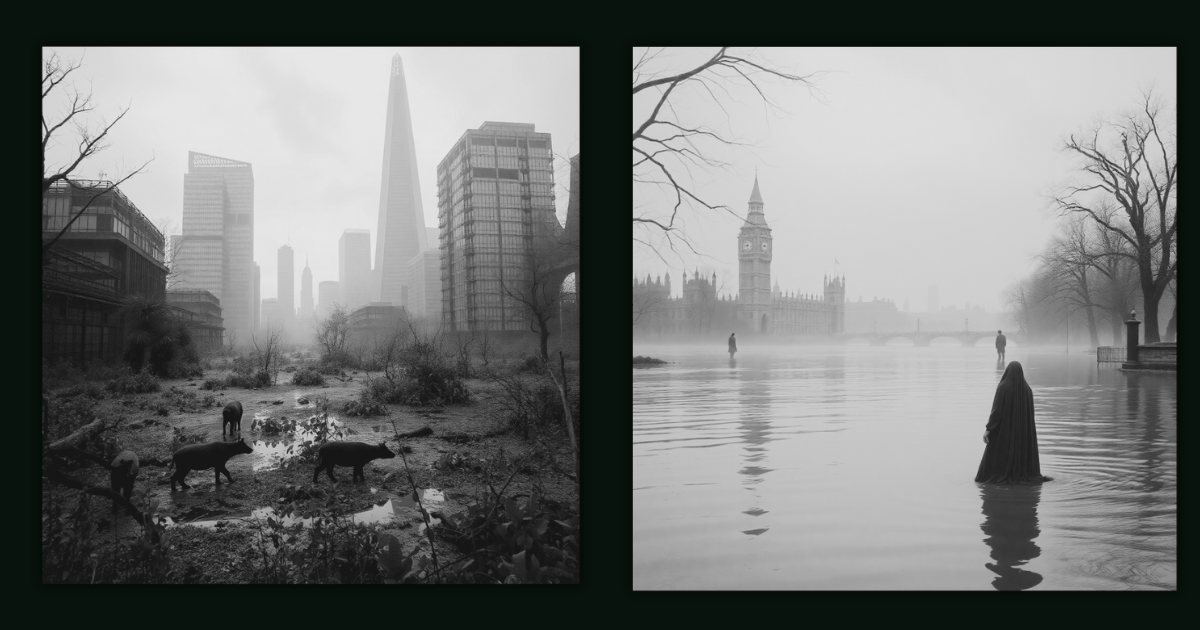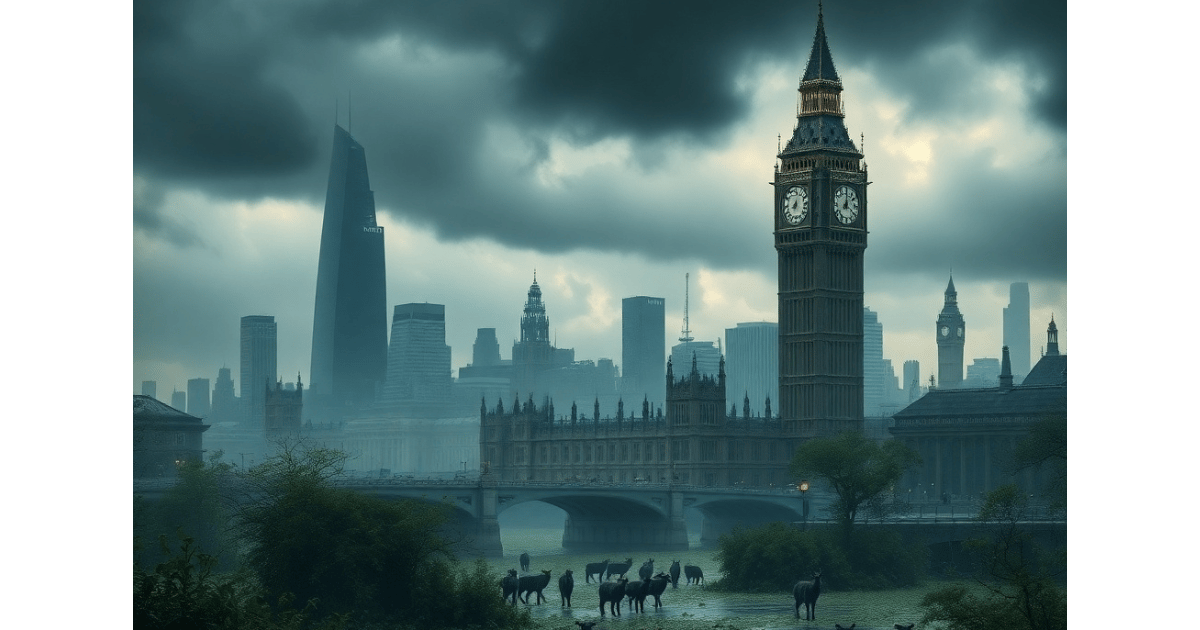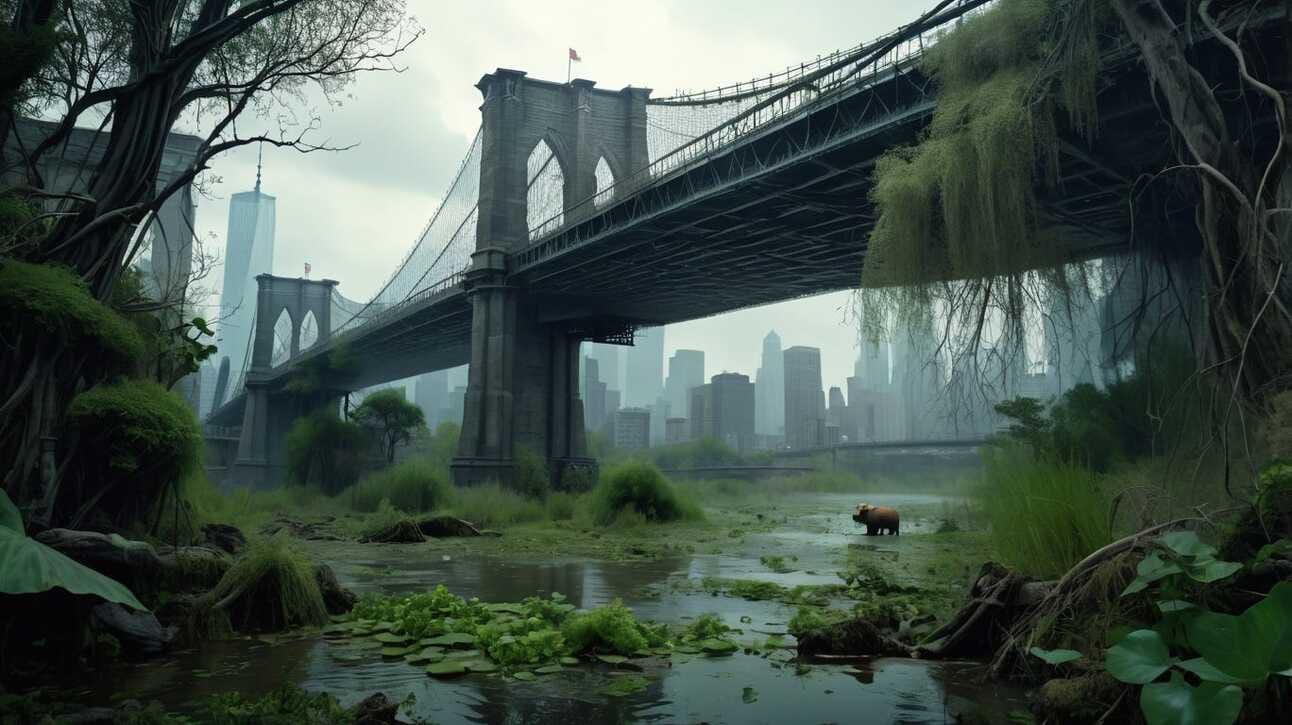Ever imagine what it would feel like to live through an ecological dystopia?
Flooded streets. Internet blackout. Forests reclaiming highways. Once science fiction fantasies, collapse scenarios have become normalized in the zeitgeist. But we are not the first generation to worry about extreme weather, or the end of days.
In 1885, English nature writer Richard Jefferies peered centuries ahead to imagine it in After London. Published at the height of Victorian industrial confidence, his novel depicts a future England returned to wilderness after an unspecified catastrophe—the city of London was drowned beneath a toxic swamp.
The peasants who remain have forgotten "the ancients" are their flying machines and voices traveling through wires. They've relapsed into feudal barbarism amid nature's relentless reconquest.
Remember a few short years ago when wildlife reclaimed pandemic-emptied cities?
Jefferies' forgotten masterpiece asked an unsettling question: If our high-tech society fell into ruin, would lush greenery fill the void and how would we adapt?

"It became green everywhere in the first spring, after London ended, so that all the country looked alike."
Richard Jefferies (1848–1887) wrote those haunting words at the height of Victorian optimism. Growing up roaming Wiltshire's fields and hedgerows, he developed an intimate understanding of nature that defined his work. One admirer called him "perhaps the most brilliant imaginative observer of trees and animals and flowers and weather in his century."
Today we have far more understanding of the natural world, but at the same time more institutional momentum imperiling it.
By the 1880s, London was the "workshop of the world" belching coal smoke, while telegraphs, railways, and telephones were shrinking time and distance, but increasing dependence on complex systems.
In a bold reversal of Victorian narratives of progress, Jefferies imagined England's grand civilization abruptly collapsing and nature triumphant. The novel's first part, "The Relapse into Barbarism," reads like time-lapse photography steadily engulfing London in forests and swamps. Its second part, "Wild England," follows a young protagonist navigating a brutal neo-feudal society arising from the ashes.
Victorians expecting a typical adventure were shocked—it presented a sobering parable of societal fragility. Today, while not an original narrative, it still forces us to confront an uncomfortable truth: In the contest between nature's patience and human progress, who really wins?

Nature's Swift Reconquest
"By the thirtieth year [after the disaster] there was not one single open place... where a man could walk, unless he followed the tracks of wild creatures or cut himself a path.... From an elevation, therefore, there was nothing visible but endless forest and marsh."
Alan Weisman's 2007 book The World Without Us reads like a scientific validation of Jefferies' scenario: high-rises would collapse, subway tunnels flood, and wildlife would thrive—exactly as imagined in 1885.
The Loss of Knowledge
"Those who were left behind were ignorant, rude, and unlettered, it consequently happened that many of the marvellous things which the ancients did, and the secrets of their science, are known to us by name only.... Of these things not a relic remains to us."
We should read it not merely as fiction, but as a warning of the fragility of our technology-enabled society. Few of us really understand the complexity we rely on day to day. If disaster strikes, a whole range of specialized knowledge could perish with the owners. Modern collapse fiction from A Canticle for Leibowitz to Station Eleven explore such a scenario—but Jefferies was there first, imagining future Brits treating "the ancients" (us!) as mythic beings who performed technological magic.
A Toxic Legacy, not so far-fetched
"A foul, toxic swamp covers the land that was once London which—owing to the masses of noxious coal—if you breathe the air around it, will kill you."
Consider Chernobyl's radiation zone, toxic dumps like Love Canal, and microplastic-filled landfills—areas effectively uninhabitable for generations. Jefferies gives us a literal vision of London drowned and stagnating. His fictional swamp even has a sand barrier separating "sweet water" from the tainted lake, just like real containment efforts at polluted sites.
Survival of the Fittest
"After the event, the weaker dogs such as the poodle—'plentiful among the ancients'—have perished while the bigger, more powerful dogs retreated into the vast forest... and have become wolf-like and tear and mangle for sheer delight of blood."
Today we have whole TV shows about what would happen to domesticated species if humans vanished. Feral dog packs in post-disaster zones show similar patterns. Jefferies even anticipated invasive ecology: he describes plagues of mice and rats exploding in number, then being checked by predators in a new balance.

The Godfather of Post-Apocalyptic Fiction
Though initially overlooked, After London's revolutionary ideas quietly influenced generations of writers and thinkers.
Socialist visionary William Morris was a direct disciple whose utopian novel News from Nowhere (1890) depicts a post-capitalist pastoral England. After reading Jefferies, Morris wrote that "absurd hopes curled around my heart"—a startling reaction to a grim apocalypse. After London helped catalyze early environmental utopian thinking.
In genre literature, his influence appears in works like M.P. Shiel's The Purple Cloud (1901) and numerous H.G. Wells novels.
The book's ecological prophecy resonated beyond science fiction, influencing nature writers like W.H. Hudson and literary figures like novelist John Fowles, who wrote an introduction to a 1980 edition of After London.
I recently read White Noise by Don DeLillo which satirically chronicals a quirky American family tormented by a mysterious “Airborne Toxic Event” amidst deeper critique of consumerist culture, media saturation and suburban ennui.
Every film about nature reclaiming a post-human Earth can be tracedto Jefferies, circa 1885.
Knowledge Becomes Myth
Victorian knowledge devolves into myth amongst the survivors. The provocative question: how to preserve knowledge, and what happens if we don't?
Jefferies shows people remembering telephones as legends of men who could speak across vast distances. The language to describe technology fades; what remains sounds like magic. This concept—civilizational amnesia—challenges conventional wisdom about progress. Knowledge isn't inherited genetically; each generation must learn it or lose it.
Modern society, with its ubiquitous internet and cloud storage, feels immune to forgetting. But consider how dependent we are on digital platforms. Our collective memory is increasingly stored in formats useless without electricity and servers. If a global crisis hit (a solar flare wiping out electronics), we might find ourselves bewildered like peasants, staring at broken machines with no idea how they worked.
The hard truth: much of our knowledge is effectively outsourced to our tools. Knowledge preservation cannot be just about high-security vaults but must be kept in communities through printed archives and teaching fundamental skills.

Fast-forward to 2125: A historian stumbles upon remnants of us. Which modern marvels would mystify future generations if society "reset" like in After London?
Tell us: What knowledge would you be most desperate to preserve for people hundreds of years from now, and why?
Share your thoughts—your answer might be featured in our next newsletter!
Richard Jefferies’ most enduring insight: nature's patience outlasts our hubris.
The warning is clear: our cities, technologies, and social order are more fragile than they seem. But hope threads through Jefferies' pages: forests regrow, lakes cleanse, and humanity adapts.
Ink & Time recovers forgotten works that speak to contemporary challenges. Subscribe for more explorations of literary foresight.
Explore these related works spanning two centuries of imaginative apocalypses:
1. The Last Man by Mary Shelley (1826) – The first modern apocalyptic novel follows the sole survivor of a pandemic wandering a deserted world.
2. News from Nowhere by William Morris (1890) – Inspired by After London, Morris offers a utopian post-collapse England with handmade cottages and communal orchards.
3. The Purple Cloud by M. P. Shiel (1901) – An extravagant tale of a toxic cloud wiping out humanity, heavily influenced by Jefferies.
4. Earth Abides by George R. Stewart (1949) – After a plague decimates civilization, survivors rebuild while technology rusts and nature reclaims cities, just as Jefferies foresaw.
5. The World Without Us by Alan Weisman (2007) – This non-fiction book scientifically explores how Earth would recover if humans vanished—essentially Jefferies' vision backed by research.
